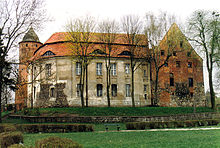Wedego von Wedel (Court Marshal)
Wedego von Wedel († 1324 in Uchtenhagen near Freienwalde in Pomerania ) was a Pomeranian court marshal and military leader.
Wedego von Wedel was a son of Hasso von Wedel-Kremzow , who, after he had conquered the Kastellaneiburg Driesen at the end of the 13th century and was appointed head of the local bailiwick by Margrave Otto IV. , Was named Hasso von Driesen.
Wedego von Wedel was involved in various legal acts of the Brandenburg margrave Waldemar since 1304 and in the capture of Danzig in 1308 . Since 1311 it appeared in Pomeranian documents, around 1313 in a contract between the Pomeranian Duke Otto and the city of Stettin. Probably in 1315, now a knight, he led the Brandenburg departments together with Günther von Kefernburg in military conflicts with Denmark. In 1316 he was mentioned as chamber master (head of finance) of Margrave Waldemar von Brandenburg and between 1317 and 1322 as court marshal of Duke Wartislaw IV of Pomerania.
On the first day of Pentecost in 1319 in Eberswalde, he acquired the Schivelbein lordship in the north of Neumark from the Brandenburg margrave . The purchase price of 11,000 marks silver, about 36 quintals of silver according to the 1309 coin order, "was so terribly high that the entire frond would not have been able to kill it" (Kortlepel 1925, p. 17). Apparently, earlier expenses were deducted and services rendered offset. The subject of the purchase contract was "House and town Schivelbein with country and people, upper and lower court" and all arable land. The margrave renounced the right to open the town and castle, so that the position that Wedego von Wedel had achieved can be described as "almost sovereign" (Podehl 1975, p. 388).
The death of the margrave a few months later, on August 14, 1319 in Bärwalde , gave the neighbors the opportunity to occupy parts of the march . Duke Heinrich II of Mecklenburg, for example, seized the Uckermark in autumn 1319. The Pomeranian Duke also pursued expansive goals, although he initially claimed a legally privileged position as guardian of the heir to the throne Heinrich , who was just eleven years old and whose "tutor" he had been in Neumark since September 1319 (Heinrich died in July 1320 also in Bärwalde) could. Wedel made himself available to him as a military leader for the recovery of the Uckermark. Documented is the statement of costs that he presented to the Pomeranian Duke for the campaign in 1321, which was carried out with the participation of forces from Neumark, Silesia, Lusatia and the Mark Meissen.
In 1324 Wedego von Wedel, the Wedel family and, under their influence, the neumarkian estates joined the Wittelsbach margrave Ludwig . For the next forty years the Wedel sided with the Wittelsbachers. Wedego von Wedel died in the same year in his castle in Uchtenhagen. Like the surrounding estates, it might have served to reimburse war costs that Wedel had taken on for the Duke. As Herr von Schivelbein, he was inherited by his son Hasso von Wedel-Schivelbein . Descendants of his second son Wedego von Wedel , who, like his brother, took part in the campaign of 1320/21 and, like the latter, temporarily acted as Vogt of the Neumark, were members of the Freienwalde-Mellen family, such as Hasso von Wedel .
literature
- Grzegorz Jacek Brnahmowicz : Wyprawa wojenna marszałka ksiażąt pomorskich Wedegona von Wedel w latach 1320-1321 na tle rywalizacji o władzę w Brandenburgii . Two volumes. In: Stargardia 4, 2004.
- Christian Gahlbeck: On the origin and composition of the Neumark nobility up to the middle of the 14th century. In: Klaus Neitmann (Hrsg.): Rulers, nobility and cities in the medieval and early modern Neumark. Berlin 2015, pp. 115–181.
- Helga Cramer: The Lords of Wedel in the country over the Oder. Property and rule formation up to 1402. In: Yearbook for the history of Central and East Germany . Volume 18, Berlin 1969.
- Ludwig Kortlepel: Schivelbeiner history and stories. Schivelbein in 1925.
- Wolfgang Podehl: Castle and rule in the Mark Brandenburg. Cologne and Vienna 1975.
| personal data | |
|---|---|
| SURNAME | Wedego from Wedel |
| BRIEF DESCRIPTION | Pomeranian court marshal and military leader |
| DATE OF BIRTH | 13th century or 14th century |
| DATE OF DEATH | 1324 |
| Place of death | Uchtenhagen near Freienwalde in Pomerania |
